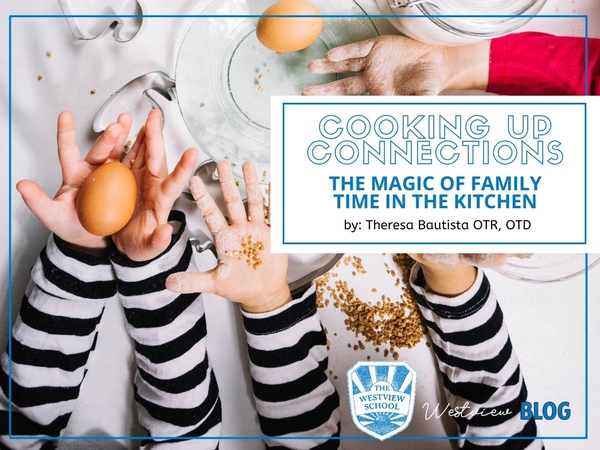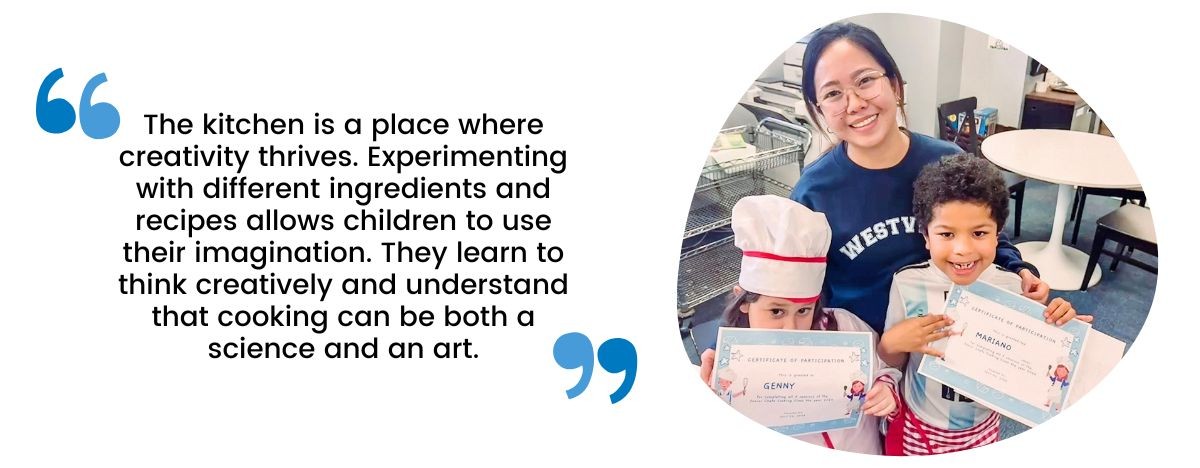
The Westview School Blog
Cooking Up Connections: The Magic of Family Time in the Kitchen

Parents are often looking for recommendations for fun family activities that could enrich their child’s life. Often, the best options can be found right at home.
Have you ever thought about involving your child in the kitchen? Activities such as preparing dinner, making a snack, or trying out a new recipe together can be a great start!

Cooking Skills and MORE
We all know that cooking teaches essential skills like measuring ingredients, following the sequence of steps in a recipe, and using various kitchen tools and equipment. Cooking provides an opportunity for children to learn how to handle utensils, chop vegetables, and stir batter. However, cooking offers far more than just the ability for your child to prepare meals for themselves and the family.
The kitchen is also an excellent place for sensory exploration – touching sticky textures (like dough) and experiencing various temperatures. Children with sensitivities to touch, taste, and smell, including those often described as "picky eaters," can benefit from this exposure, provided it allows them to explore at their own pace. This multi-sensory experience can expand their palate or help accommodate their specific support needs. For example, they may discover that wearing gloves can help their ability to handle certain textures.
The kitchen is not just a place for culinary adventures, it's also a classroom for safety. It's a perfect setting to teach children about the importance of being aware of extreme temperatures, sharp objects, breakables, and heavy items.
If you have concerns about kitchen safety, rest assured that there are kid-friendly tools like knives and scissors, non-slip cutting boards, and step stools available. You can gradually introduce them to heated tools, based on your and your child’s comfort level. This is also a great opportunity to demonstrate how to safely use the oven, stove, or air fryer.

The Beauty of Cooking at Home
One of the best things about cooking with your kids in the kitchen is that you can make this a space for them to explore, make mistakes, and learn in a safe and familiar environment. When things get messy, spills happen, hands get sticky, or something breaks accidentally, allowing them to experience the natural consequences, teaches cause and effect. Initially, holding back immediate corrective feedback and allowing them to do it themselves allows them to learn and adjust. This approach builds their confidence and kitchen skills and reinforces your role as a trusted adult they can rely on for guidance.
These moments in the kitchen become cherished family stories, offering a chance to share the joy of creating something. Children witness firsthand how to communicate and how cooperation leads to a delicious end product. When families cook together, they learn to work as a team.
As children grow more comfortable in the kitchen, they gain independence. Learning to prepare meals for themselves is an essential life skill throughout their lifespan. The confidence they earn from these experiences extends beyond the kitchen and may contribute to overall self-esteem. If cooking is an accessible skill for your child, there are benefits to starting early and introducing them to the kitchen, especially if this is an area of interest.
By making cooking a shared family activity, you not only impart essential life skills to your children but also create a nurturing environment. So, roll up your sleeves, grab those aprons, and enjoy the many rewards of cooking together!
---
Theresa is a Registered Occupational Therapist with experience working with children, youth, and adults with neurological differences in the private school, clinic, and community settings. She received her Doctorate Degree in Occupational Therapy from The University of Texas Medical Branch at Galveston. Prior to becoming an occupational therapist, she worked in the field of Applied Behavior Analysis as a Registered Behavior Technician. She is also a writer and consultant who offers her specialized knowledge to websites and companies serving the neurodiverse community.
The Experts' Guide to Picky Eaters

Are mealtimes a battle? Does your child have a limited food repertoire or only eat one brand of food? Desperately seeking tips for a successful family mealtime? The Stewart Center has some Picky Eater experts on staff to share their favorite tips and best practices from hands-on experience working with some of the pickiest eaters and their families.
The first question many families ask is: Who can help? Eating is a multisensory experience. As adults, we forget the many factors involved in eating because it is such a routine task for most of us, but eating is a surprisingly complex process. Both speech and occupational therapists can play an essential role in supporting positive change in even the pickiest of eaters.
Abby Cook, M.S. OTR, and Alexandra (Ali) Nevins, M.S., CCC-SLP are part of The Westview School's Stewart Center team and are trained in the S.O.S. Approach to Feeding®. This approach is a sensory-based feeding intervention that moves students through a hierarchy of exercises designed to increase tolerance of various foods. The S.O.S. Approach to Feeding® was developed by Dr. Kay Toomey over 30 years ago. Her program has a high success rate in the diversification of diets of picky eaters.
Because eating uses every sensory system, from visual and tactile to vestibular and interoception, a multisensory approach to feeding therapy is the start to a recipe for success. Pun intended. The Stewart Center therapists are trained in evaluation and assessments and the facilitation of individual and group feeding therapy.
When it comes to feeding therapy, a speech therapist, like Ms. Ali, can assess and support the development of a child's oral motor and feeding skills, mechanisms of chewing and swallowing, oral motor structure as well as protecting the airway during the swallow, biting, and chewing phases of eating.
An occupational therapist (OT), like Ms. Abby, can help to develop a child's fine motor skills and coordination needed to move food from plate or hand-to-mouth. Skills such as grasping, utensil use, postural control, and musculoskeletal strength for positioning during eating are necessary for successful feeding. An O.T. can also observe and assess environmental factors, modify or make changes to support optimal focus and attention to eating. Both speech and occupational therapists will consider all of these factors when working with children with food aversions to identify how to best help an individual child.
Today, we want to offer some quick tips that you can implement at home now. When dealing with a picky eater, it is essential to examine three things – the environment, language, and behaviors we model. Start with a quick check by asking yourself these questions:
- Is there a smell or taste that is overwhelming or underwhelming to your child?
- Is the environment overstimulating?
- Is there background noise during mealtimes, such as television or music?
- Does your child have the opportunity to watch a sibling or parent eat and model typical feeding behaviors?
- Can your child manipulate a utensil successfully?
- Do you find yourself saying two more bites, and then you can go (i.e., play, watch tv, or play the IPad).
Try these tips to skip those mealtime battles and help your kiddo expand their palate and self-feeding skills.
Set Up for Success: Check Your ENVIRONMENT
- Seating tops the list of important environmental factors for a successful mealtime. Think 90-90-90. Hips, knees, and elbows should be at 90-degree angles while seated for eating. Stick to a sturdy chair or highchair at the table.
- Provide appropriately sized utensils at mealtime, and use fun phrases to initiate utensil use during mealtime like "Catch the food on the fork."
- Keep food portions small – especially with new foods. The new color, smell, or texture may be overwhelming! Always provide at least one familiar food item for your child to eat. Make sure to have some new options to try exploring, but a safe food should be just that - one that feels "safe."
- Keep regular mealtime routines to lower stress and keep expectations clear for everyone.
- Have your child throw away their uneaten food items in the trash. This gets them one step closer to interacting with food, even if it is to throw it away.
- Limit both visual and audible distractions during mealtime. Television, music, and iPad can detract from your child's ability to observe typical eating and self-feeding.
- Model it! Eat meals together as much as possible. Children need to see visual models of typical eating behaviors.
Hungry for LANGUAGE. While your focus may be on what should be going in your child's mouth, what comes out of yours matters just as much.
It might be time to flip the script if you have said one of the following to your picky eater: "Clean your plate." "You have to take two bites to leave the table." "Good job eating that." "Finish your food before (i.e., T.V. or Dessert)." These phrases can unwittingly up the anxiety during mealtime.
Instead, use some alternate words/phrases that keep mealtime stress-free and fun.
- In response to, "I'm not going to eat that!" ask, "What can you do with the cheese stick?" It helps to give an example: "Can you make a mustache or wiggle it like a wobbly worm?"
- "What can you catch on your fork?"
- "Does that food have a big flavor?"
-Encourage your child to say, "I'm still learning about that." instead of "I don't like that!"
Your mother may have said, "Don't play with your food!" but when it comes to a picky eater, it might be time to change your BEHAVIOR around eating.
- Model eating and be PLAYFUL! Make food fun! Make it ok to "play" with your food. Parents can model food interactions that go beyond simply eating; encourage play during mealtime. Some examples of play can include: placing food on body parts, making a noodle into a worm, using crackers to build a sandwich, digging for gems in jello or pudding, and using food as a mustache or a long tongue.
- Avoid forcing your child to take a bite or a drink of something. This sets up an unwinnable power struggle.
- Avoid tricking your child with foods or beverages. As therapists and parents, we need to build and maintain a child's trust-related to food and drinks. When we "sneak" a new vegetable or drink into a familiar dish or a preferred cup, it can disrupt trust and turn a child off from a preferred food altogether.
We hope that these tips help you gain confidence and avoid some pitfalls at mealtime with your picky eater. If you want to learn more about Individual or Group Feeding therapy, please reach out to The Stewart Center. Our team is passionate about working with our picky eaters, supporting their families, and having fun with food.
If you are interested in learning more, contact The Stewart Center at 713-973-1830.
Additional Resources:
Instagram:
@kids.eat.in.color
@sosapproachtofeeding
@solidstarts
Websites and free resources:
sosapproachtofeeding.com/start-here-parents/
www.solidstarts.com
Parent & Caregiver Workshop (Free Full parent workshop video)
Learn from Dr. Toomey (the founder of the SOS Approach to Feeding) about why children don’t eat well and practical strategies for improving mealtimes in your home through the introductory video “When Children Won’t Eat (and how to help!).
--
Alexandra (Ali) Nevins, M.S., CCC-SLP is a Licensed Speech-Language Pathologist with the Texas Department of Licensing and Regulation and obtained a Certificate of Clinical Competence through the American Speech-Language-Hearing Association. Ali completed her Bachelor of Applied Science Degree from The University of Mississippi and received a Masters of Science in 2018 from Yeshiva University at The Katz School. In New York City, Ali worked as a clinical extern in the school system as well as at New York Neurogenic Speech-Language Pathology, P.C. Ali has been working full-time as an SLP at The Stewart Center at The Westview School since 2018. She has received continuing education training in SOS Approach to Feeding ® and Social Thinking ®.
Abby Cook, M.S., OTR is a Licensed Occupational Therapist with the Texas Board of Occupational Therapy Examiners and obtained certification through the National Board for Certification in Occupational Therapy. Abby completed her Bachelor of Arts degree in Psychology and Family Studies at St. Olaf College in Minnesota, and received a Master’s of Science in Occupational Therapy from the University of New England in Portland, Maine in 2017. Once in the Houston area, Abby started her OT career in Early Childhood Intervention for Brazoria County and has been full-time with the Stewart Center at The Westview School since 2018. Her continuing education training includes SOS Approach to Feeding ® and introductory coursework in The DIR/Floortime Approach®.
When it's More than "Picky Eating"

Many parents have children who are picky about the foods they eat. However, some children seem to take this selectivity to an unusual or extreme level. When this happens, parents can become desperate and resort to strategies or techniques that they would never consider for other issues. Stockpiling fast food cheeseburgers or making multiple trips to the grocery store just to ensure that the “right” chicken nuggets are available may not be a parent’s ideal response to a picky eater, but many families have had to use these strategies just to keep their children eating.
"If you have a picky eater, it is likely that you have had at least one person say, 'If she gets hungry enough, she’ll eat!' The truth is that this 'traditional wisdom' that kids will eventually eat what is provided or repeatedly presenting the same food until the child eats it does not work for all children."
If you have a picky eater, it is likely that you have had at least one person say, “If she gets hungry enough, she’ll eat!” The truth is that this “traditional wisdom” that kids will eventually eat what is provided or repeatedly presenting the same food until the child eats it does not work for all children. This appears to be especially true for children with intense sensory needs, like those that often occur alongside autism. These families often feel trapped by their child’s picky eating, limiting the places they go or even the family trips they take due to concerns over whether they will be able to get their child to eat and/or the behavior they might use when their preferred foods are not available. When good, old-fashioned consequences, rewards, and bribery are ineffective at expanding a child’s food repertoire, specific intervention may be necessary.
What can you do to help expand your child’s palate? Many families find relief in sensory-based feeding intervention, such as the S.O.S. Approach to Feeding®. This approach draws on the expertise of psychologists, speech-language pathologists, occupational therapists, dieticians, and the medical community to provide an intervention that is Sequential, sensitive to the Oral-motor needs of each child and addresses the Sensory needs that are likely involved in a self-restricted diet. Typically implemented in a group setting, the S.O.S. Approach to Feeding® aims to change the ways that children learn to explore new foods by integrating play and positive experiences with the introduction of new foods. The Stewart Center is fortunate to have two professionals trained in this approach and offers groups for different ages, as well as individual sessions, if needed.
The holiday season provides a particularly challenging set of social expectations, especially when it comes to food and eating. Children are often asked to eat (or at least tolerate) foods that are unfamiliar to them. Loud and embarrassing refusals can ensue, leading to hurt feelings and even family conflict. Teaching children more socially acceptable ways to decline non-preferred foods is a good first step toward navigating these tricky situations. For example, in our “Picky Eaters” group, children are taught that brains need lots of information before making a decision, and that we avoid saying “I don’t like that” until our brains have collected enough of this information. Instead, we say “I’m still learning about that.” Not only is this less offensive to whomever prepared the food, but it also opens the door for playful interactions with the food as we continue to gather our important information.
However your family copes, we want everyone to know that picky eaters do not have to dictate your family’s choices, and that there are more options than simply accepting your new, limited experience.
If you would like to learn more, The Stewart Center offers family consultations, group or individual therapy sessions, or even just help troubleshooting or brainstorming. Call 713-973-1842 to find out more.
